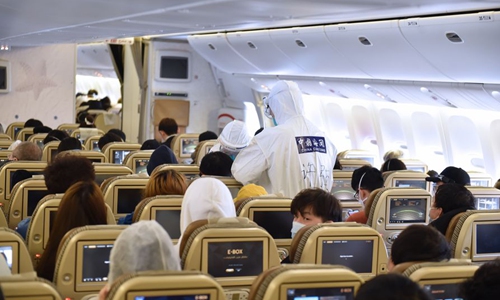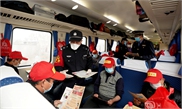
Customs officers inspect an inbound flight at the Capital International Airport in Beijing, capital of China, March 18, 2020. (Xinhua/Chen Zhonghao)
The city of Beijing is going full throttle in the race against imported coronavirus cases to defend the epidemic fight results by upgrading quarantine measures on every international arrival to the city and lashing policy violators with legal punishments including entry-deny.
Beijing's Center for Diseases Prevention and Control (Beijing CDC) announced Tuesday the city's first coronavirus patient believed to have been infected by a person returning from overseas.
All the residents in the whole building will receive COVID-19 test as Beijing CDC believes the patient might have been infected by the imported case, as the two shared the same "polluted" stairway, media reported.
A total of 31 imported infection cases were recorded in Beijing on Monday, regardless that the Civil Aviation Administration had eased the burden for the capital by diverting all Beijing-bound international flights to 12 designated entry ports in nearby cities.
Facing the potential crisis, the Beijing CDC stipulated that starting from Wednesday, all arrivals in Beijing, regardless of their destination, must receive nucleic acid tests and undergo quarantine, an upgrade from the 14-day isolation policy for all arrivals.
Punishments are rising to stop sneaking and concealing. On Tuesday, Beijing's border inspection authorities said they have banned four foreigners suspected of violating coronavirus prevention and control policies from entering the capital.
The move is believed to be an implementation of Monday's stipulation that any arrivals that conceal their health status and refuse to cooperate with border staff shall be stopped from entry. China announced last week that people who obstruct border health checkups, including concealing one's health status, will be punished and convicted.
With 6,000 inbound passengers per day, Beijing was seen as the main battlefield for preventing imported cases, and the capital airport faces an unprecedented challenge amid the large number of returned people.
The imported number is yet to see a major decline, and Beijing's defense lines are still solid overall. Wu Zunyou, an expert from the Chinese CDC, said at Tuesday's briefing that China has built up three defensive lines to combat imported coronavirus, namely the customs checkup, 14-day quarantine and medical institutions. Most of the imported cases were caught by the first two defensive lines, and no patient was found in the third one.


